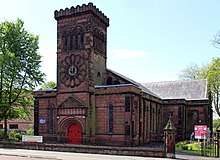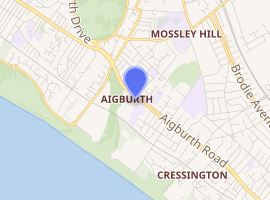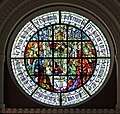Church of St Anne, Aigburth
The Church of St Anne is in Aigburth Road, Aigburth, Liverpool, Merseyside, England. It is recorded in the National Heritage List for England as a designated Grade II* listed building,[1] and is an active Anglican parish church in the diocese of Liverpool, the archdeaconry of Liverpool and the deanery of Liverpool South Childwall.[2] Its architecture is an early example of the Norman Revival style.[1][3]
| Church of St Anne, Aigburth | |
|---|---|
 Church of St Anne, Aigburth, west end | |

| |
| 53.3694°N 2.9305°W | |
| OS grid reference | SJ 381 862 |
| Location | Aigburth, Liverpool, Merseyside |
| Country | England |
| Denomination | Anglican |
| Website | St Anne's, Aigburth |
| History | |
| Status | Parish church |
| Architecture | |
| Functional status | Active |
| Heritage designation | Grade II* |
| Designated | 12 July 1966 |
| Architect(s) | Cunningham and Holme |
| Architectural type | Church |
| Style | Norman Revival |
| Groundbreaking | 1836 |
| Completed | 1914 |
| Specifications | |
| Materials | Ashlar stone, slate roof |
| Administration | |
| Parish | Aigburth: St Anne |
| Deanery | Liverpool South Childwall |
| Archdeaconry | Liverpool |
| Diocese | Liverpool |
| Province | York |
| Clergy | |
| Vicar(s) | Ian Greenwood |
| Curate(s) | Matt Davis |
| Laity | |
| Reader(s) | Ruth Anders, Paul O'Brien |
| Churchwarden(s) | Ian Devine, Paul Roberts |
History
The church was built in 1836–37 to a design by Cunningham and Holme.[3] It was founded by a group of local merchants, John Moss, Charles Stewart Parker, John Abraham Tinne and Josias Booker and was consecrated in 1837.[4] In 1853–54 broad transepts were added and the chancel was extended. The north and south galleries were removed in 1893–94 and in 1913–14 the chancel was further extended.[3]
The church was damaged in an arson attack by Suffragettes on 16 December 1913. The altar and choir stalls were burned during a period when this movement to obtain votes for women was increasingly militant.[5]
Architecture
The church is built in ashlar stone with a slate roof in Norman Revival style.[1][3] Its plan consists of a west tower flanked by a baptistry to the north and a stair bay to the south, a four-bay nave, north and south transepts, and a three-bay chancel with the organ loft to the north and a vestry to the south. The round-headed entrance is in the base of the tower with blind arcading and a diapered gable above it. Over this is a clock face surrounded by a large rose motif. The tower has paired two-light bell openings on each face over which is a cornice with corbels and a parapet with blind arcading.[1] The east window consists of three lancets and a rose window. The west gallery is still present as are the galleries in the transepts.[3]
External features
The gate piers are listed at Grade II. There are two pairs of gate piers, which are made in stone, and are also Norman Revival in style. They are octagonal, with features including arcading, corbels, and finials.[3][6]
Community
The church adjoins St Margaret's Church of England Academy and is used at times as the venue for carol and other services.
Images
 Grade II listed gatepiers
Grade II listed gatepiers Looking along the nave towards the chancel
Looking along the nave towards the chancel Looking along the nave towards the west end
Looking along the nave towards the west end Circular part of the east window
Circular part of the east window Sanctuary window showing Jesus cleansing the leper
Sanctuary window showing Jesus cleansing the leper Carving of a grotesque on the west end
Carving of a grotesque on the west end
References
- Historic England, "Church of St Anne, Aigburth Road (1068405)", National Heritage List for England, retrieved 1 April 2013
- St Anne, Aigburth, Aigburth, Church of England, retrieved 1 April 2013
- Pollard, Richard; Pevsner, Nikolaus (2006), Lancashire: Liverpool and the South-West, The Buildings of England, New Haven and London: Yale University Press, p. 380, ISBN 0-300-10910-5
- Fleetwood-Hesketh, Peter (1955), Murray's Lancashire: Architectural Guide, John Murray, p. 157
- Cowman, Krista (2004). Mrs Brown is a Man and a Brother: Women in Merseyside's Political Organisations, 1890-1920. Liverpool University Press. p. 90. ISBN 978-0-85323-738-9.
- Historic England, "Gate piers to Church of St Anne, Aigburth Road (1068406)", National Heritage List for England, retrieved 6 September 2013